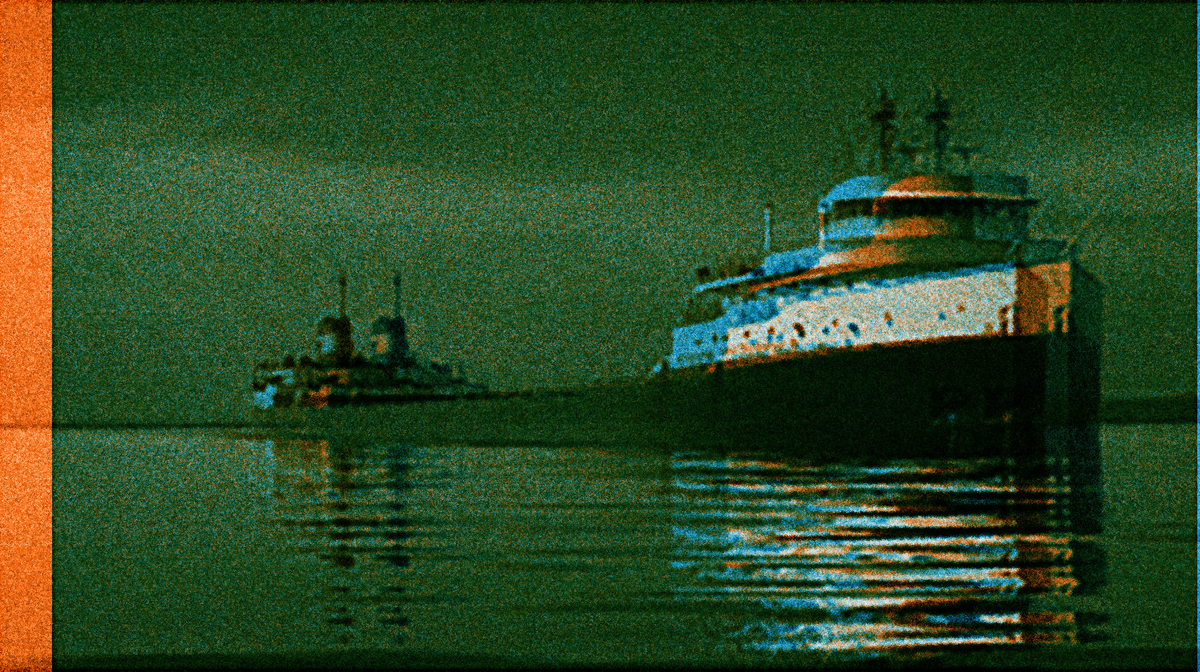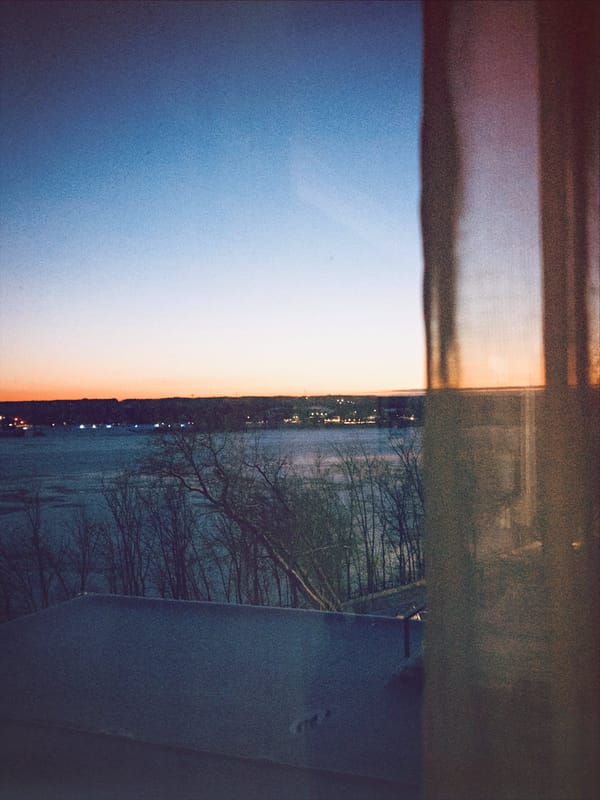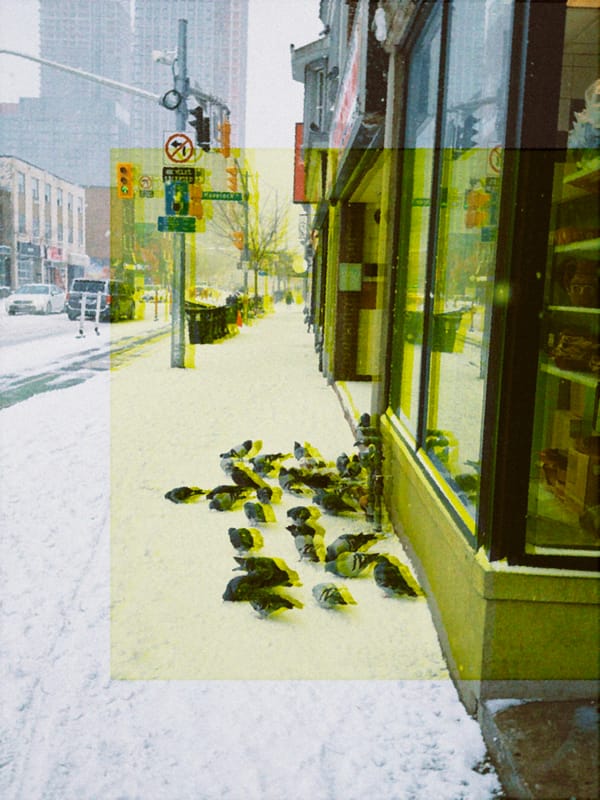The Gales of November remembered
This is the beauty of the song, the heart of it in those who lost their lives in service of building a world many believed they never belonged to, as if they are men out of time.

I spilled a large black Tim Hortons coffee on myself in the drive-thru line early in the morning of crisp, dark Yukon winter. An hour so small and so unseemly that all Gods and men who witnessed it would curse its name forever. The coffee spilled was one that I needed more than I wanted, and burst out from the top when my eager hands gripped its cardboard vessel a little too tight around the middle. I have never liked the taste of Tim Hortons coffee, but I have always craved the way coffee feels, and like all addictions it is sometimes less about the quality and more about the seconds you get to feel alive before you fall back into the familiar comforting of wanting to die. The woman at the window laughed and said it happened all the time, which didn’t make me feel any better, but it did make me feel less alone. She poured me another, and slipped me the rest of my order; a box of TimBits and an everything bagel— toasted and buttered —and said that she hoped the day improved from there. I thanked her, and drove off through a billowing snowstorm onto a long stretch of lonely highway heading north, my brand new work van loaded to bear with supplies for a job in a small-town hours away. Its first, and last, journey.
It was dark and cold, the snow blowing fast in a headwind at my van, and I had to fight the tunnel vision of driving through a snowstorm in the bitter darkness. In the Yukon, the daylight hours are scarce and fleeting in the winter, and you learn to train your eyes to see through the darkness. Not to seek light, but to find form and order in the void of the early morning, to keep an eye out for danger and avoid death that lurks around all corners.
Today, November 10, 2025, is the anniversary of the sinking of the Edmund Fitzgerald, which sank 50 years ago in Lake Superior, claiming the lives of all 29 crewmen on board. A boat and its men memorialized forever in a song written the same year by Gordon Lightfoot, which would become an unexpected success upon its release the following year. I grew up listening to Gord, a nickname I knew from the title of a record lying on the carpet of the living room of my youth, because of my dad. He owned an impressive run of Lightfoot records, including Gord’s Gold a greatest hits collection, and played his music softly in headphones at night when he came home to rest from a long day of exhaustive labour. None of the records my dad owned contained “The Wreck of the Edmund Fitzgerald”, but it remains a song I have known for as long as I can remember knowing anything at all. I have always known Superior never gives up her dead when the skies of November turn gloomy.
There are a great many things you can say about this song, how there is no bridge or chorus to be found, and that is because it’s a dirge more than it is anything. A song meant to place flowers on graves that would never hold bodies within them. Lightfoot was inspired by an article in Newsweek detailing the fateful accident, and with words cribbed from the pages of the magazine, wrote one of his great, lasting works. A song that saw fit to find beautiful words honouring the men who worked a hard and dangerous job, work that many would scoff at, or pass off as punishment for the uneducated masses. Hauling iron ore from port to port over a body of water known as much for its beauty as it was for its danger. Lightfoot references the Indigenous people of the region at the head of the song, recalling their knowledge of the lake, and how it claims the bodies of those who don’t see the fangs until her jaw is upon them.
That morning in the winter alone on the highway, I drove slow and careful through the snow, until the day finally broke, and the skies became clear as unfinished canvas. The snow pulled back and away, and suddenly the skies were a vibrant blue without a cloud to blemish them. The sun rose somewhere on the horizon, and the day promised to be something more than the morning’s fangs had threatened. I felt my body relax, and drove steadily onwards. Fingers drumming on the steering wheel in time with music played on a click-wheel iPod tethered to an FM receiver plugged into the cigarette lighter. The terrible coffee long cold in the cupholder, the stain of the morning's spill masking the new car smell seeping out from the vinyl covering of the GMC Cargo Van I had only started to convert to a work van. Like my dad, and his before him, I am a journeyman Glazier (glassworker). It is a hard and dangerous job that my mom was hesitant to allow me to enter. She knows the scars on my dad’s body and the stories that shaped them, and wanted to avoid me having to tell someone the map of my skin someday. I followed him into the work despite her concerns, and my body is now a collection of stories held together by scars and failing muscles, and I have never regretted it.
There’s a joke I see now on social media, how people are surprised “The Wreck of the Edmund Fitzgerald” was written about an event in the 1970s because it feels to many like a song that belongs to the 1700s. As if labour and the men who die in its name belong to some era long in the rearview. As if the unseen work that builds a world happened before we had eyes to see it. What is notable to me about the song, above all song structure and interesting musical notes, is that it is a song about labour and class and death that is never patronizing or put upon. It is firmly rooted in the 70s, it is only just that people do not see much of the labour of this world and the people who do it as real at all. This is the beauty of the song, the heart of it in those who lost their lives in service of building a world many believed they never belonged to, as if they are men out of time.
When the skies in the winter turn clear, it is beautiful, but it is not always welcome. The snow had left my vision and the roads were clear, and I had relaxed just enough that I stopped looking for danger on the road. That was my downfall. When you lose control on the ice or anywhere, you have little time to correct yourself before you have to let go and see what the final call will be. I turned a corner doing 80 KM/H and didn’t see the patch of black ice on the highway until I was upon it. The van fishtailed once, the rear wheels kicking sharply to the left and my hands swiftly and carefully steered into the skid, hoping to find control of the wheel again. As I fishtailed in the other direction I fought desperately for control I had never held, and continued as my brand-new tires kicked out again, one last time. My hands gripped the steering wheel, hoping that I would be the one person alive who defied the wisdom of death and fought back against all the things I could not control. When my van spun around backwards on the highway, I thought I would never control anything ever again, and then its steel body hit the embankment, and drivers-side-first I was flung over the side of the highway into nothing.
Everyone will have a favourite line in a song like “The Wreck of the Edmund Fitzgerald”. Over the years, I have held to many. When the cook says fellas it’s been good to know ya, or all that remains is the faces and the names of the wives and the sons and the daughters, or the haunting guitar solo the plays in the wordless moment where the boat sinks into the depths of the water. What gets me, though, is does anyone know where the love of God goes when the waves turn the minutes to hours. Knowing the men died in that lake, so close to their destination, so close to telling stories long into their years about that night in November. How they might have had scars to show, or a pinched nerve that caused pain to shoot down their leg to remind them. But the waves had other plans, and this one last story will never be theirs to tell.
I wonder how it felt for those men in the water, once the boat had gone below the lake. How many might have floated to the surface and waited for someone to come and save them. How many knew their friends and crewmen were already lost, waiting for them to join their company below. I wonder how it felt in the grip of that cold and terrible water, counting down the seconds until the end.
The van stopped rolling and settled back on its tires, and for a second that might have lasted forever I thought I was dead. My childhood friend had died a few years before me when his truck rolled on the highway leading to the oil sands in Fort McMurray, and I thought we had simply found one final thing in common. I could move my arms though, and neither hurt that badly, so I unclipped my seat belt, grabbed my keys, my iPod, and a flip phone with no service and carefully opened the van door to the outside world. The wind whipped my face, I locked the door and looked at the roof of the van that now showed metal peeling away and reaching for the sky. An aluminum box in the back of the van had flown through the roof as we rolled, I would later discover. I walked slowly and carefully to the side of the highway, looked at my phone again to confirm there was no cell service, and waited to see what my fate would be.
I don’t know how long it was, minutes maybe, an hour perhaps, before a car came along and stopped to pick me up. The driver, a young man, told me someone had stopped him at the gas station a few kilometres up the road to tell him there had been an accident, and asked if he would go check it out. He told me he thought he was going to find a body, and I laughed uneasily as I slid my tired body carefully into the bucket seat of his Dodge Neon. I told him he had, just a body that was mostly still alive, and we drove back in the direction of home, not noticing the blood running down my forehead until we stopped for shitty gas station coffee an hour later. I had been struck by something as the van rolled, a tube of caulking maybe or a tool of some kind. When the van was eventually towed back to the shop, I noticed my skill saw had become lodged under the seat and imagined what might have happened if it had been the thing that struck me.
That the song doesn’t end when the boat hits the water is its great success. In a musty old hall, which Lightfoot would later change to be rustic old hall for live performances after some complaints by parishioners, the families, and community gather in grief. They rang the bell once for each man, 29 times total, who lost their lives onboard the SS Edmund Fitzgerald. That there was such beautiful tribute paid to them is remarkable, as so often the labour performed by people like those 29 men is performed unseen and unremarked upon. I have known people who died while working with hands that bled just as easily as they were stained by dirt and oil, and they are rarely if ever the source of great and grand memorial. I have thought about my death more times than I can count, and in my life of labour I have come close to it four times in total. Each one a lasting memory, each of them a stain on my vision when I close my eyes at night. I will always feel that van hit the side of the road as I feel so many of the scars and bruises on my body, and I have heard the way people spoke to me about the work that I performed while gathering the stories marked upon me. I knew what memorial I felt people like me were owed in this life, and it is in Lightfoot’s work that we catch a glimpse of something more. Something that reminds me that all of us deserve to be remembered with such grace and great humility.




